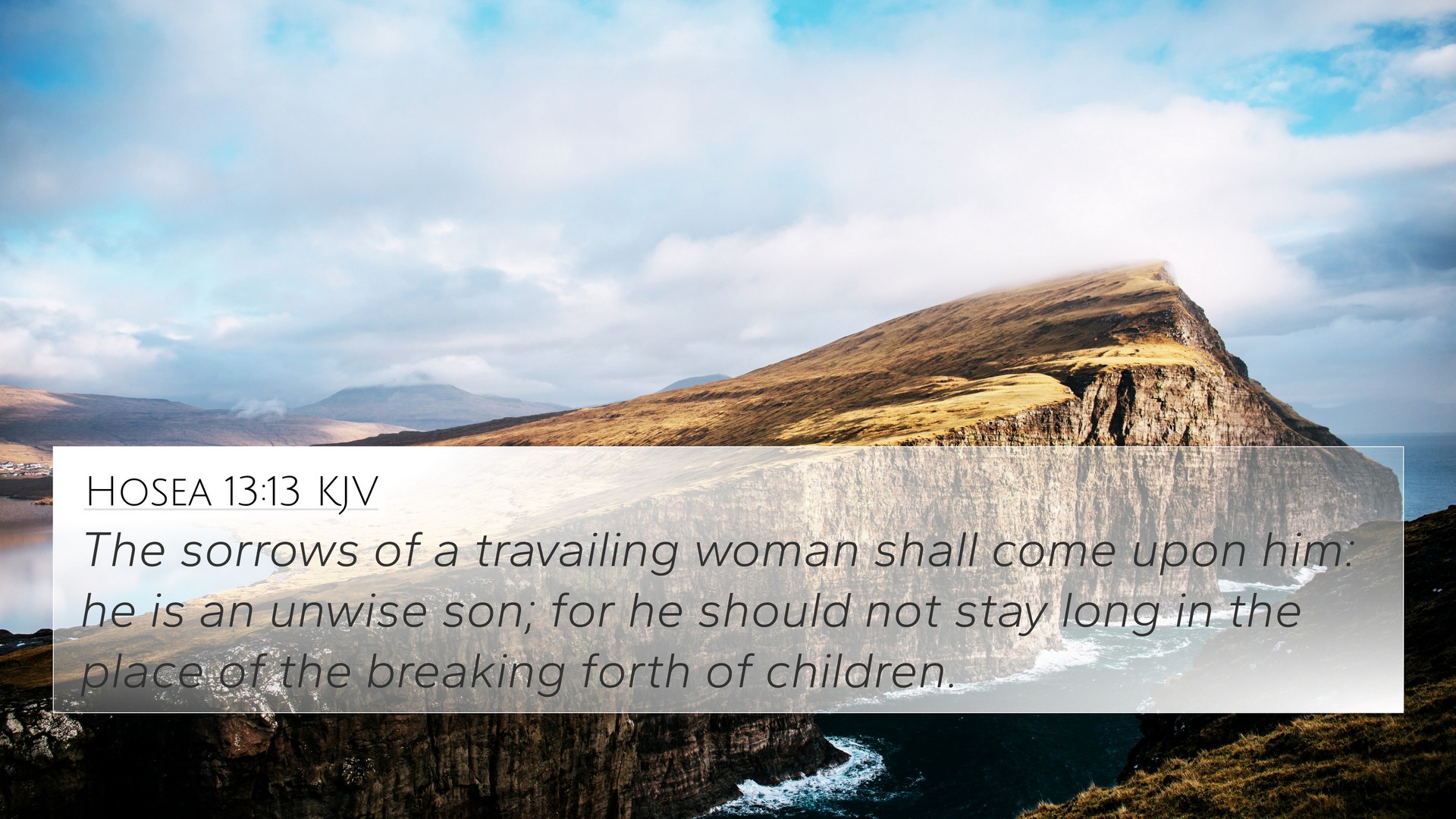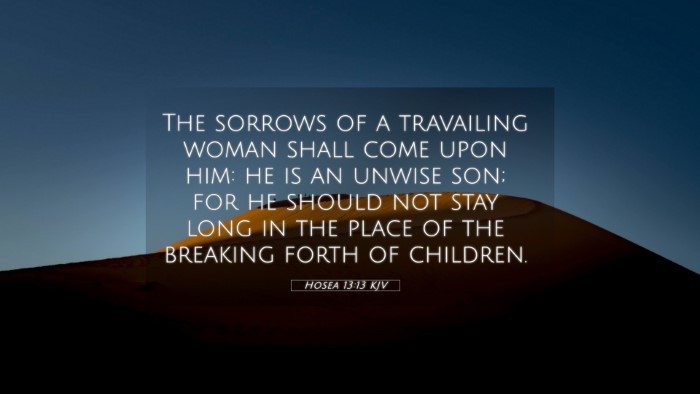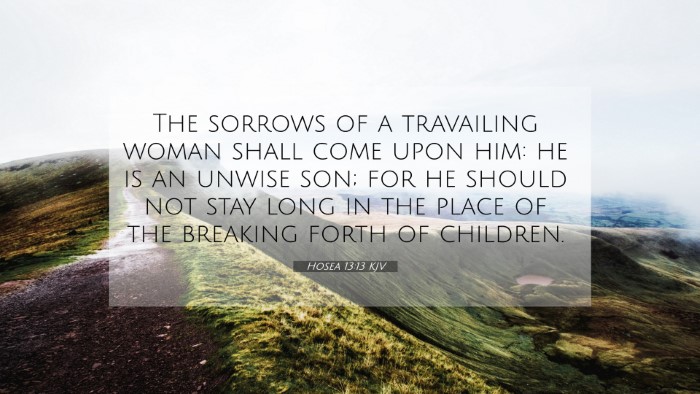Old Testament
Genesis Exodus Leviticus Numbers Deuteronomy Joshua Judges Ruth 1 Samuel 2 Samuel 1 Kings 2 Kings 1 Chronicles 2 Chronicles Ezra Nehemiah Esther Job Psalms Proverbs Ecclesiastes Song of Solomon Isaiah Jeremiah Lamentations Ezekiel Daniel Hosea Joel Amos Obadiah Jonah Micah Nahum Habakkuk Zephaniah Haggai Zechariah MalachiHosea 13:13 Similar Verses
Hosea 13:13 Cross References
The sorrows of a travailing woman shall come upon him: he is an unwise son; for he should not stay long in the place of the breaking forth of children.
Uncover the Rich Themes and Topics of This Bible Verse
Listed below are the Bible themes associated with Hosea 13:13. We invite you to explore each theme to gain deeper insights into the Scriptures.
Hosea 13:13 Cross Reference Verses
This section features a detailed cross-reference designed to enrich your understanding of the Scriptures. Below, you will find carefully selected verses that echo the themes and teachings related to Hosea 13:13 KJV. Click on any image to explore detailed analyses of related Bible verses and uncover deeper theological insights.
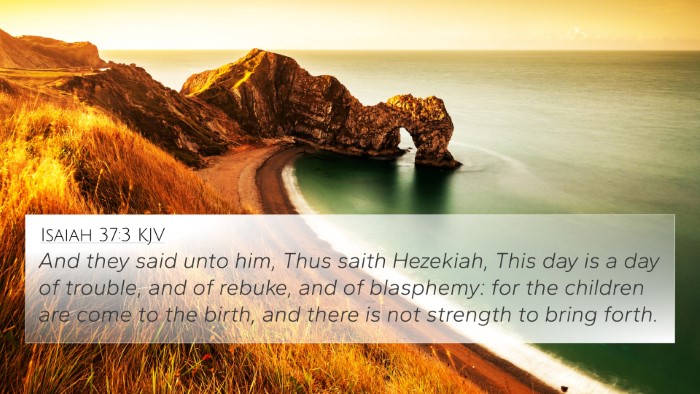
Isaiah 37:3 (KJV) »
And they said unto him, Thus saith Hezekiah, This day is a day of trouble, and of rebuke, and of blasphemy: for the children are come to the birth, and there is not strength to bring forth.
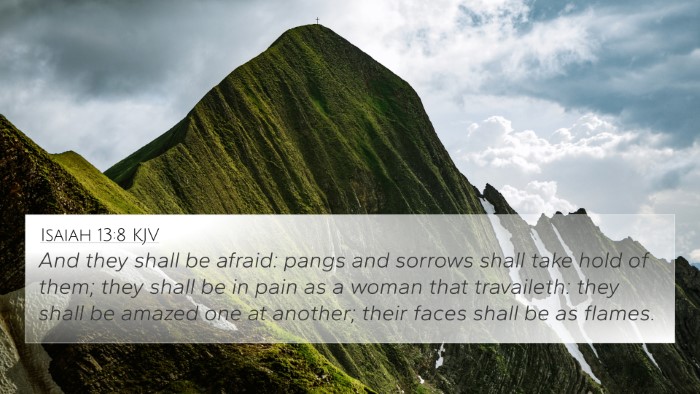
Isaiah 13:8 (KJV) »
And they shall be afraid: pangs and sorrows shall take hold of them; they shall be in pain as a woman that travaileth: they shall be amazed one at another; their faces shall be as flames.

Micah 4:9 (KJV) »
Now why dost thou cry out aloud? is there no king in thee? is thy counsellor perished? for pangs have taken thee as a woman in travail.
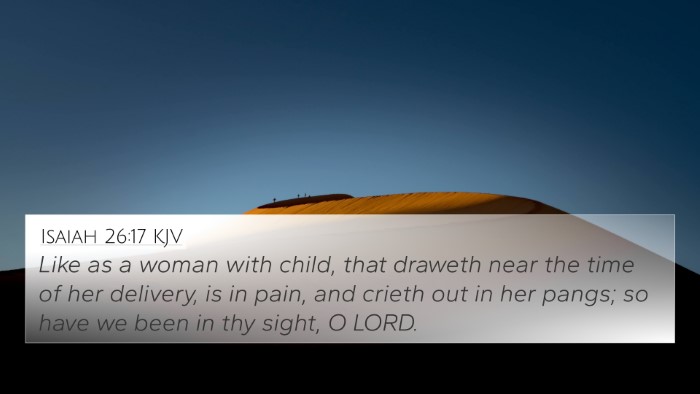
Isaiah 26:17 (KJV) »
Like as a woman with child, that draweth near the time of her delivery, is in pain, and crieth out in her pangs; so have we been in thy sight, O LORD.
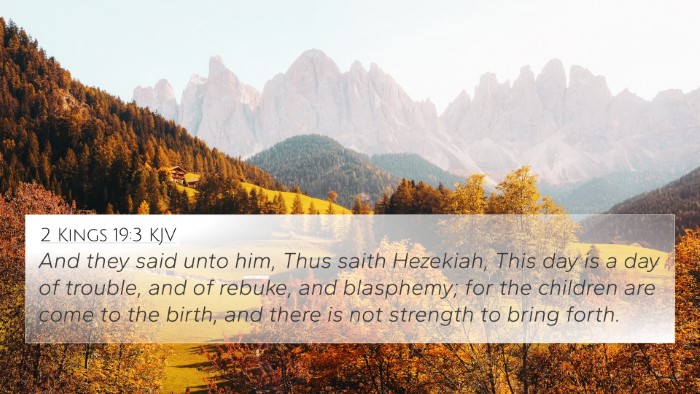
2 Kings 19:3 (KJV) »
And they said unto him, Thus saith Hezekiah, This day is a day of trouble, and of rebuke, and blasphemy; for the children are come to the birth, and there is not strength to bring forth.
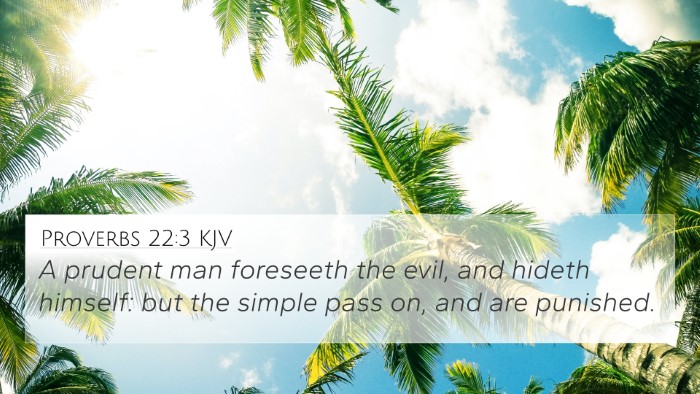
Proverbs 22:3 (KJV) »
A prudent man foreseeth the evil, and hideth himself: but the simple pass on, and are punished.
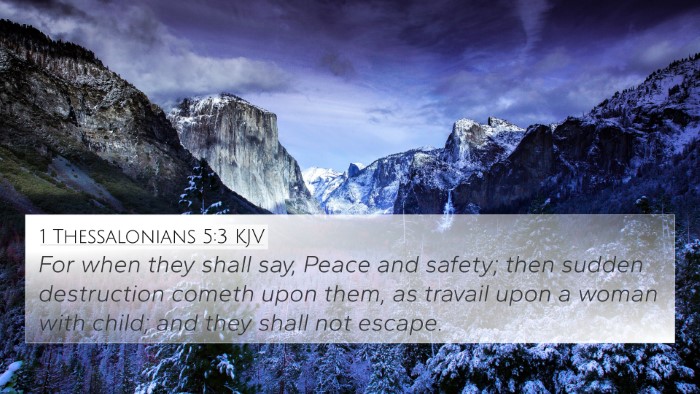
1 Thessalonians 5:3 (KJV) »
For when they shall say, Peace and safety; then sudden destruction cometh upon them, as travail upon a woman with child; and they shall not escape.
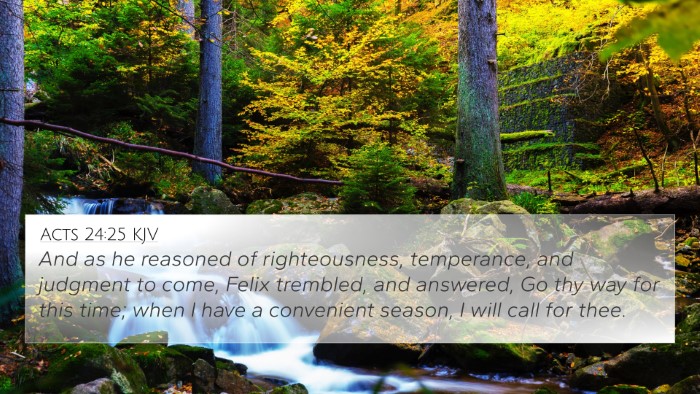
Acts 24:25 (KJV) »
And as he reasoned of righteousness, temperance, and judgment to come, Felix trembled, and answered, Go thy way for this time; when I have a convenient season, I will call for thee.

Acts 16:29 (KJV) »
Then he called for a light, and sprang in, and came trembling, and fell down before Paul and Silas,
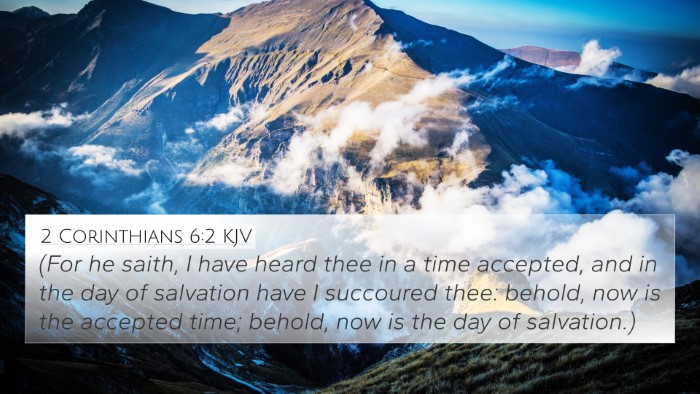
2 Corinthians 6:2 (KJV) »
(For he saith, I have heard thee in a time accepted, and in the day of salvation have I succoured thee: behold, now is the accepted time; behold, now is the day of salvation.)
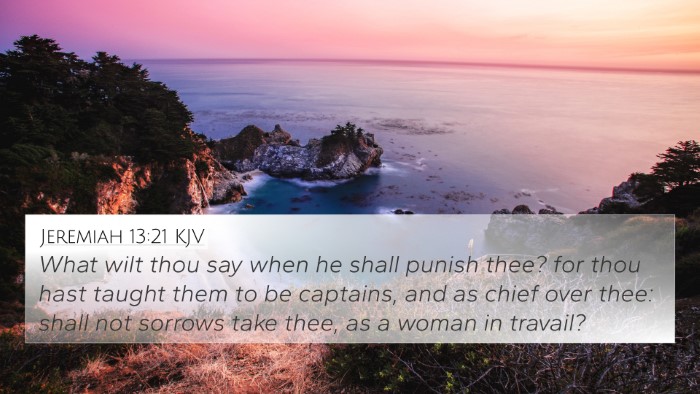
Jeremiah 13:21 (KJV) »
What wilt thou say when he shall punish thee? for thou hast taught them to be captains, and as chief over thee: shall not sorrows take thee, as a woman in travail?
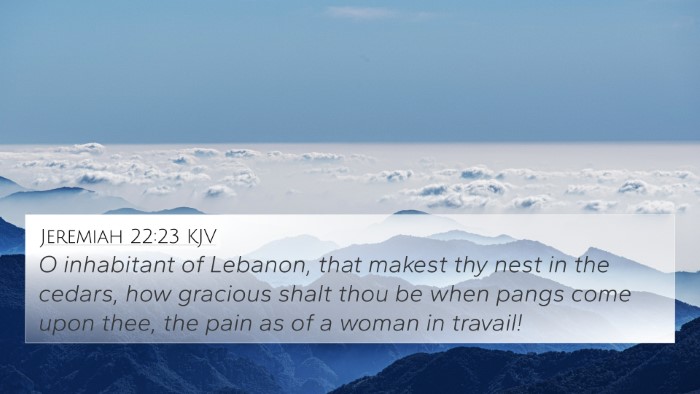
Jeremiah 22:23 (KJV) »
O inhabitant of Lebanon, that makest thy nest in the cedars, how gracious shalt thou be when pangs come upon thee, the pain as of a woman in travail!
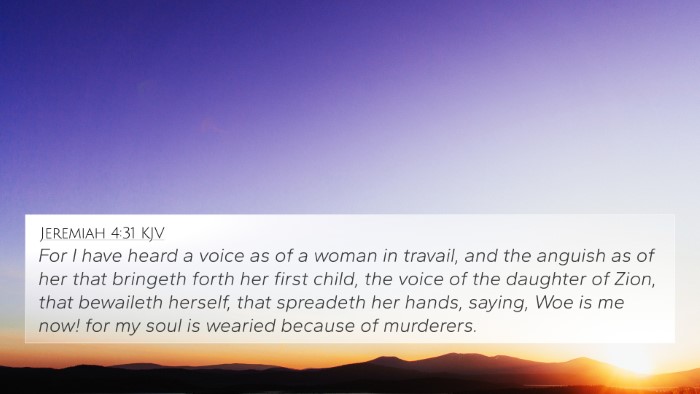
Jeremiah 4:31 (KJV) »
For I have heard a voice as of a woman in travail, and the anguish as of her that bringeth forth her first child, the voice of the daughter of Zion, that bewaileth herself, that spreadeth her hands, saying, Woe is me now! for my soul is wearied because of murderers.

Jeremiah 30:6 (KJV) »
Ask ye now, and see whether a man doth travail with child? wherefore do I see every man with his hands on his loins, as a woman in travail, and all faces are turned into paleness?

Jeremiah 49:24 (KJV) »
Damascus is waxed feeble, and turneth herself to flee, and fear hath seized on her: anguish and sorrows have taken her, as a woman in travail.
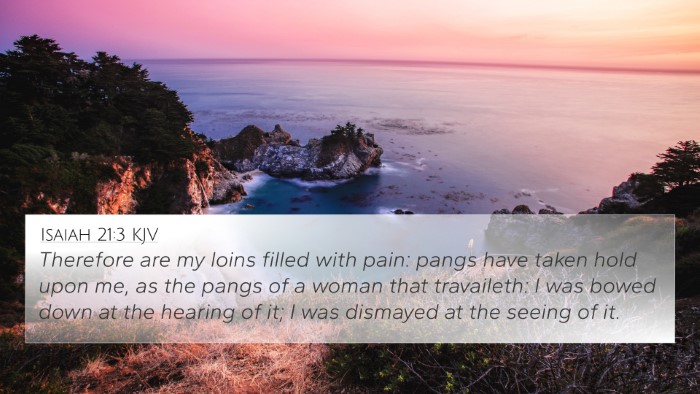
Isaiah 21:3 (KJV) »
Therefore are my loins filled with pain: pangs have taken hold upon me, as the pangs of a woman that travaileth: I was bowed down at the hearing of it; I was dismayed at the seeing of it.
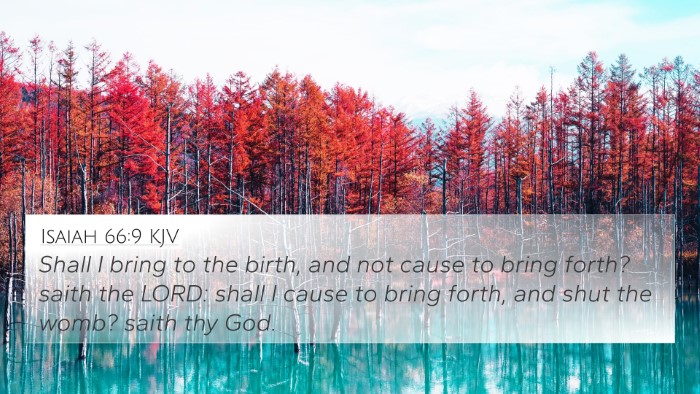
Isaiah 66:9 (KJV) »
Shall I bring to the birth, and not cause to bring forth? saith the LORD: shall I cause to bring forth, and shut the womb? saith thy God.
Hosea 13:13 Verse Analysis and Similar Verses
Understanding Hosea 13:13
Verse: Hosea 13:13 - "The sorrows of a travailing woman shall come upon him: he is an unwise son; for he should not stay long in the place of the breaking forth of children."
Summary of Meaning
This verse conveys a dire warning about the impending consequences of unwise actions. The imagery of a woman in labor illustrates the intensity of the coming sorrows. Hosea highlights the folly of the people represented as "an unwise son," indicating a failure to heed wise counsel or the signs of the times.
Commentary Insights
The insights drawn from public domain commentaries such as Matthew Henry, Albert Barnes, and Adam Clarke provide a multifaceted understanding of this verse:
- Matthew Henry:
Henry emphasizes the inevitability of suffering as a consequence of sin. He draws parallels between the pain of childbirth and the turmoil that will befall the nation of Israel due to their rebellion against God.
- Albert Barnes:
Barnes notes that the phrase "the sorrows of a travailing woman" signifies an unavoidable distress, underscoring the urgency and severity of the impending judgment. He reflects on the foolishness of those who ignore divine warnings.
- Adam Clarke:
Clarke provides historical context, suggesting that this verse maps the patterns of Israel's conduct and the resulting divine chastisement. His analysis includes the metaphor of labor pains which symbolizes the painful consequences of turning away from God's ways.
Cross-References
To fully appreciate Hosea 13:13, we can explore several Bible cross-references that relate to its themes of judgment, folly, and the consequences of unfaithfulness:
- Jeremiah 30:6-7: "Ask now, and see whether a man doth travail with child? wherefore do I see every man with his hands on his loins, as a woman in travail, and all faces are turned into paleness?"
- Micah 4:10: "Be in pain, and labour to bring forth, O daughter of Zion, like a woman in travail: for now shalt thou go forth out of the city, and thou shalt dwell in the field, and thou shalt go even to Babylon; there shalt thou be delivered; there the LORD shall redeem thee from the hand of thine enemies."
- Proverbs 1:7: "The fear of the LORD is the beginning of knowledge: but fools despise wisdom and instruction."
- Hosea 4:6: "My people are destroyed for lack of knowledge: because thou hast rejected knowledge, I will also reject thee, that thou shalt be no priest to me: seeing thou hast forgotten the law of thy God, I will also forget thy children."
- Proverbs 10:1: "The proverbs of Solomon. A wise son maketh a glad father: but a foolish son is the heaviness of his mother."
- Isaiah 26:17-18: "Like as a woman with child, that draweth near the time of her delivery, is in pain, and crieth out in her pangs; so have we been in thy sight, O Lord. We have been with child, we have been in pain, we have, as it were, brought forth wind; we have not wrought any deliverance in the earth; neither have the inhabitants of the world fallen."
- Galatians 4:19: "My little children, of whom I travail in birth again until Christ be formed in you."
Thematic Connections
Hosea 13:13 provides rich material for thematic Bible verse connections, portraying the consequences of abandoning wisdom and the inherent suffering that ensues. The metaphoric language links it to broader biblical themes such as divine judgment, repentance, and the paradox of wisdom versus folly.
Exploring Cross-References
Using tools for Bible cross-referencing, one can analyze not just the immediate context of Hosea but also its connections to the New Testament, where themes of labor and the pain of disobedience are prevalent. The study of inter-Biblical dialogues sheds light on these themes through analytical methods:
- Tools for Cross-Referencing: A good Bible concordance will enhance one's ability to link scriptures, encouraging deeper studies.
- Understanding Context: Identifying connections between Old and New Testament augments comprehension; one can see how these sorrows culminate in the New Covenant.
- Thematic Studies: Comparative studies of the prophets provide invaluable insights into the continuity and fulfillment of themes across the testaments.
Conclusion
In conclusion, Hosea 13:13 serves as a poignant reminder of the consequences associated with folly and the need for wisdom in navigating life's challenges. Through cross-referencing Bible verses and utilizing a solid cross-reference guide, believers can grasp the broader implications of this verse and its relevance to their spiritual journey.
